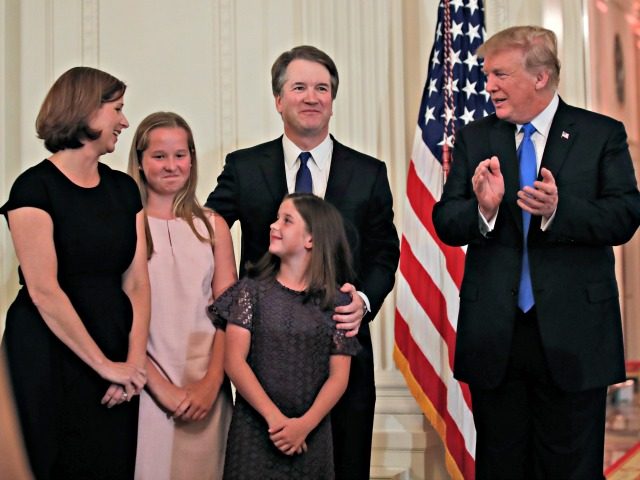President Donald Trump often boasts of his accomplishments in nominating federal judges, and for good reason: at the close of his first term, he will have confirmed more judges to the federal judiciary in one term than any recent U.S. president.
As of October 5, according to the Heritage Foundation, Trump has confirmed 218 judges to Article III courts — that is, the “Supreme Court of the United States, the U.S. courts of appeals, the U.S. district courts and the U.S. Court of International Trade.”
On October 26, that number will rise to 219 with the confirmation of Amy Coney Barrett to the Supreme Court.
No president in the past four decades has appointed more judges in a first term. The only one who appointed more was Jimmy Carter, who appointed 248 — but he had the advantage of an expanded federal judiciary.
Under Carter, Congress added 152 new judgeships — nearly one-third of the previous total — and Carter filled them quickly. (Democrats want to expand and “pack” the Supreme Court if Joe Biden wins the 2020 election — not because of a backlog in the courts, which Carter faced, but for ideological reasons.)
Trump has also appointed 53 appellate judges, leaving no vacancies on that level.
Currently, Trump has appointed more than one-fourth of active federal judges. That is a large proportion — but Barack Obama’s appointees still account for nearly 40% of the federal bench, according to the Pew Research Center.
That means Trump will need a second term if he is to establish a solid “constitutional conservative” foundation for the federal judiciary.
There are three things that make Trump’s judicial appointments special. The first is the timing.
Trump won the 2016 election as Senate Republicans were blocking the confirmation of Judge Merrick Garland to the Supreme Court. Had Trump lost, the Court would have had a liberal majority — perhaps for decades.
By filling the empty seat vacated by the passing of Justice Antonin Scalia in 2016, Trump preserved a nominal conservative majority. He will expand it with Barrett’s confirmation.
Second, Trump has appointed an unusually large number of appellate judges. These are among the most powerful judges in the system, and they form the primary pool of candidates for appointment to the Supreme Court. Trump has created a deep bench from which Republican presidents can draw in the future (including himself, if he wins a second term in office).
Third, President Trump’s judicial appointees have been vetted by conservative legal authorities, including the Federalist Society, which promotes the originalist school of constitutional interpretation. Thus, Trump’s appointees are considered more reliably conservative than the nominees of a typical Republican president.
The gains Trump has made could quickly be reversed if Biden wins — not least because his party intends to expand the Supreme Court for the first time in 150 years.
In fact, despite the rapid pace of Trump’s appointments, new vacancies keep opening up on the federal bench. Currently, there are 64 vacancies on the federal bench — over 7% of the total seats. 40 nominations are still pending in the Senate.
A New York Times poll released last week revealed that 58% of likely voters believed the Supreme Court should not be expanded. A majority (57%) of Democrats agreed with the idea of packing the Court; 89% of Republicans opposed it.
Joel B. Pollak is Senior Editor-at-Large at Breitbart News and the host of Breitbart News Sunday on Sirius XM Patriot on Sunday evenings from 7 p.m. to 10 p.m. ET (4 p.m. to 7 p.m. PT). His newest e-book is The Trumpian Virtues: The Lessons and Legacy of Donald Trump’s Presidency. His recent book, RED NOVEMBER, tells the story of the 2020 Democratic presidential primary from a conservative perspective. He is a winner of the 2018 Robert Novak Journalism Alumni Fellowship. Follow him on Twitter at @joelpollak.

COMMENTS
Please let us know if you're having issues with commenting.